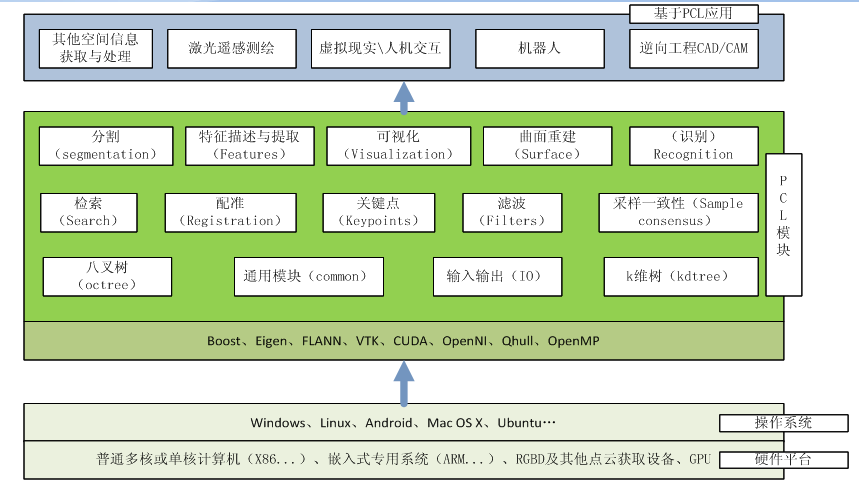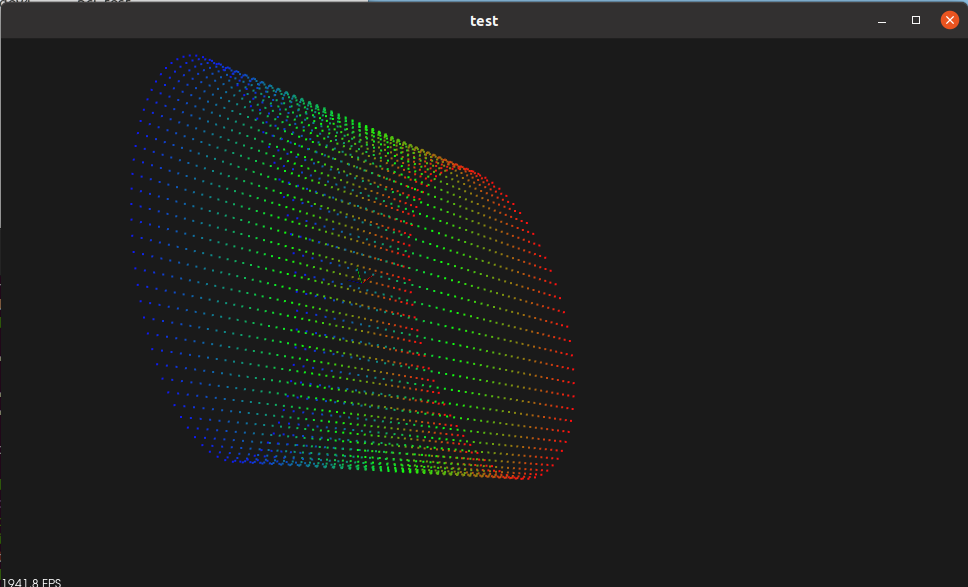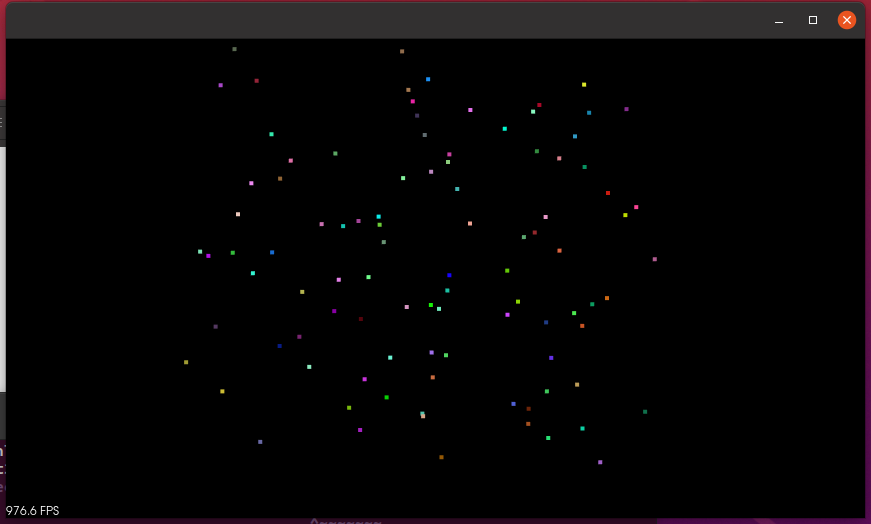- 1机器学习是什么?
- 2用Python模拟识别图片验证码并发送手机验证码
- 3鸿蒙(HarmonyOS)项目方舟框架(ArkUI)之线性布局容器Row组件
- 4【华为 ICT & HCIA & eNSP 习题汇总】——题目集12
- 5python布尔变量的值_Python的基本数据数字、字符串、布尔值及其魔法
- 6ahooks源码之useVirtualList虚拟列表
- 7Android Studio教程04-导入Eclipse项目到AndroidStudio(包括导入第三方Project项目(不是jar包形式))_非jar包sdk如何导入项目
- 8Python机器学习笔记:XgBoost算法(亲测)_xgboost.train
- 9网络通信知识总结_网络通信相关知识
- 10利用nacos在不重启项目的情况下动态修改数据源配置信息(多数据源dynamic-datasource)_@dependson("dynamicdatasourceproperties")
PCL点云库(1) — 简介与数据类型_pcl库
赞
踩
目录
1.1 简介
PCL(Point Cloud Library)是在吸收了前人点云相关研究基础上建立起来的大型跨平台开源C++编程库,它实现了大量点云相关的通用算法和高效数据结构,涉及到点云获取、滤波、分割、配准、检索、特征提取、识别、追踪、曲面重建、可视化等。支持多种操作系统平台,可在Windows、Linux、Android、Mac OS X、部分嵌入式实时系统上运行。如果说OpenCV是2D信息获取与处理的结晶,那么PCL就在3D信息获取与处理上具有同等地位。
如《PCL架构图》所示,对于3D点云处理来说,PCL完全是一个的模块化的现代C++模板库。其基于以下第三方库:Boost、Eigen、FLANN、VTK、CUDA、OpenNI、Qhull,实现点云相关的获取、滤波、分割、配准、检索、特征提取、识别、追踪、曲面重建、可视化等。

1.2 PCL安装
1.2.1 安装方法
安装链接:ubuntu20.04下安装pcl_ubuntu安装pcl_Yuannau_jk的博客-CSDN博客
1.2.2 测试程序
- cmake_minimum_required(VERSION 2.6)
- project(pcl_test)
-
- find_package(PCL 1.10 REQUIRED)
-
- include_directories(${PCL_INCLUDE_DIRS})
- link_directories(${PCL_LIBRARY_DIRS})
- add_definitions(${PCL_DEFINITIONS})
-
- add_executable(pcl_test pcl_test.cpp)
-
- target_link_libraries (pcl_test ${PCL_LIBRARIES})
-
- install(TARGETS pcl_test RUNTIME DESTINATION bin)
- #include <iostream>
- #include <pcl/common/common_headers.h>
- #include <pcl/io/pcd_io.h>
- #include <pcl/visualization/pcl_visualizer.h>
- #include <pcl/visualization/cloud_viewer.h>
- #include <pcl/console/parse.h>
-
-
- int main(int argc, char **argv) {
- std::cout << "Test PCL !!!" << std::endl;
-
- pcl::PointCloud<pcl::PointXYZRGB>::Ptr point_cloud_ptr (new pcl::PointCloud<pcl::PointXYZRGB>);
- uint8_t r(255), g(15), b(15);
- for (float z(-1.0); z <= 1.0; z += 0.05)
- {
- for (float angle(0.0); angle <= 360.0; angle += 5.0)
- {
- pcl::PointXYZRGB point;
- point.x = 0.5 * cosf (pcl::deg2rad(angle));
- point.y = sinf (pcl::deg2rad(angle));
- point.z = z;
- uint32_t rgb = (static_cast<uint32_t>(r) << 16 |
- static_cast<uint32_t>(g) << 8 | static_cast<uint32_t>(b));
- point.rgb = *reinterpret_cast<float*>(&rgb);
- point_cloud_ptr->points.push_back (point);
- }
- if (z < 0.0)
- {
- r -= 12;
- g += 12;
- }
- else
- {
- g -= 12;
- b += 12;
- }
- }
- point_cloud_ptr->width = (int) point_cloud_ptr->points.size ();
- point_cloud_ptr->height = 1;
-
- pcl::visualization::CloudViewer viewer ("test");
- viewer.showCloud(point_cloud_ptr);
- while (!viewer.wasStopped()){ };
- return 0;
- }


1.3 PCL数据类型
在头文件#include <pcl/point_types.h>中包含了所有内置的点云类型,部分如下:
- namespace pcl
- {
- /** \brief Members: float x, y, z
- * \ingroup common
- */
- struct PointXYZ;
-
- /** \brief Members: rgba
- * \ingroup common
- */
- struct RGB;
-
- /** \brief Members: intensity (float)
- * \ingroup common
- */
- struct Intensity;
-
- /** \brief Members: intensity (std::uint8_t)
- * \ingroup common
- */
- struct Intensity8u;
-
- /** \brief Members: intensity (std::uint32_t)
- * \ingroup common
- */
- struct Intensity32u;
-
- /** \brief Members: float x, y, z, intensity
- * \ingroup common
- */
- struct PointXYZI;
-
- /** \brief Members: float x, y, z, uin32_t label
- * \ingroup common
- */
- struct PointXYZL;
-
- /** \brief Members: std::uint32_t label
- * \ingroup common
- */
-
- ...
- }

(1)PointXYZ-成员变量:float x, y, z
PointXYZ是使用最常见的一个点数据类型,因为它只包含三维xyz坐标信息,这三个浮点数附加一个浮点数来满足存储对齐,用户可以利用points[i].data[0],或者points[i].x访问点的x坐标值。
(2)PointXYZI-成员变量:float x,y,z,intensity
Point是一个简单的XYZ坐标加intensity的point类型,xyz未与intensity位于同一个结构体。具体说xyz位于一个结构体,内存对齐,intensity位于另一个结构体,内存对齐(填充3个浮点数)。
(3)PointXYZRGBA-成员变量:float x,y,z,uint32_t rgba
rgba包含在一个整型变量中,其余与PointXYZI结构类似。
(4)PointXYZRGB-成员变量:float x,y,z,rgb
rgb信息包含在一个浮点型变量中,其余与PointXYZI结构类似。
(5)InterestPoint-float x,y,z,strength
strength用来表示关键点的强度测量值,其余与PointXYZI结构类似。
(6)Normal-float normal[3], curvature
Norma结构体表示给定点所在样本曲面上的法线方向,以及对应曲率的测量值。
(7)PointNormal-float x,y,z,normal[3], curvature
PointNormal是存储XYZ数据的point结构体,并且包括采样点对应法线和曲率。
(8)PointXYZRGBNormal-float x,y,z,rgb,normal[3], curvature
PointXYZNormal是存储XYZ数据和RGB颜色的point结构体,并且包括采样点曲面法线和曲率。
(9)PointXYZINormal-float x,y,z,intensity,normal[3], curvature
PointXYZNormal是存储XYZ数据和强度值的point结构体,并且包括采样点曲面法线和曲率。
(10)PointWithRange-float x,y,z(union with float point[4], range)
PointWithRange除了range包含从所获得的视点到采样点的距离测量值之外,其余与PointXYZI结构类似。
(11)PointWithViewpoint-float x,y,z,vp_x,vp_y,vp_z
PointWithViewpoint除了vp_x,vp_y,vp_z以三维点表示所获得的视点之外之外,其余与PointXYZI结构类似。
(12)MomentInvariantst-float j1,j2,j3
MomentInvariantst视野更包含采样曲面上面片的三个不变矩的point类型,描述面片上的顶带你分布情况。
(13)PrincipalRadiiRSD-float r_min,r_max
PrincipalRadiiRSD是一个包含曲面块上两个RSD半径的point类型。
(14)Boundary-uint_8 boundary_point
Boundary存储一个点是否位于曲面边界上的简单point类型。
(15)PrincipalCurvatures-float principal_curvature[3],pc1,pc2
PrincipalCurvatures包含给定点主曲率的简单point类型。
(16)PFHSignature125-float pfh[125]
PFHSignature125包含给定点的PFH(点特征直方图)的简单point类型。
(17)FPFHSignature33-float pfh[33]
FPFHSignature33包含给定点的FPFH(快速点特征直方图)的简单point类型。
(18)VFHSignature308-float vfh[308]
VFHSignature308包含给定点的VFH(视点特征直方图)的简单point类型。
(19)Narf36-float x,y,z,rool,pitch,yaw;fooat descriptor[36]
Narf36包含给定点NARF(归一化对齐半径特征)的简单point类型。
(20)BorderDescription-int x,y; BorderTraits traits
BorderDescription包含给定点边界类型的简单point类型。
(21)IntensityGradient-float gradient[3]
IntensityGradient包含给定点强度的梯度point类型。
(22)Histogram-float histogram[N]
Histogram用来存储一般用途的n维直方图。
(23)PointWithScale-float x,y,z,scale
PointWithScale除了scale表示某点用于几何操作的尺度外,其余与PointXYZI结构类似。
(24)PointSufel-float x,y,z,normal[3],rgba,radius,confidence,curvature
PointSufel存储XYZ坐标、曲面法线、RGB信息、半径、可信度和曲面曲率的复杂point类型。
1.4 PCL中自定义point类型
1.4.1 增加自定义point的步骤
(1)首先先进行结构定义
- // 定义点类型结构
- struct EIGEN_ALIGN16 MyPoint
- {
- PCL_ADD_POINT4D // 点类型有4个元素 XYZ+padding
- PCL_ADD_RGB //加颜色
- double time_stamp; //时间戳
- EIGEN_MAKE_ALIGNED_OPERATOR_NEW // 确保new操作符对齐操作
- };
(2)注册到PCL库中
- // 注册到PCL库
- POINT_CLOUD_REGISTER_POINT_STRUCT(MyPoint, //注册的结构类型
- (float, x, x) //坐标
- (float, y, y)
- (float, z, z)
- (uint32_t,rgba,rgba) //颜色
- (double, time_stamp, time_stamp) //时间戳
- );
1.4.2 完整代码
(1)自定义点云类型程序
- cmake_minimum_required(VERSION 2.6)
- project(mypoint)
-
- find_package(PCL 1.10 REQUIRED)
- include_directories(${PCL_INCLUDE_DIRS})
- link_directories(${PCL_LIBRARY_DIRS})
- add_definitions(${PCL_DEFINITIONS})
-
- add_executable(pcl_test pcl_test.cpp)
- target_link_libraries (pcl_test ${PCL_LIBRARIES})
- install(TARGETS pcl_test RUNTIME DESTINATION bin)
- // 方式一:直接写在mypoint.cpp中
- #define PCL_NO_PRECOMPILE
- #include <iostream>
- #include <chrono>
- #include <pcl/point_cloud.h>
- #include <pcl/io/pcd_io.h>
- #include <pcl/visualization/cloud_viewer.h>
- #include <pcl/PCLPointCloud2.h>
- #include <pcl/visualization/pcl_visualizer.h>
- using namespace std;
-
- // 定义点类型结构
- struct EIGEN_ALIGN16 MyPoint
- {
- PCL_ADD_POINT4D // 点类型有4个元素 XYZ+padding
- PCL_ADD_RGB //加颜色
- double time_stamp; //时间戳
- EIGEN_MAKE_ALIGNED_OPERATOR_NEW // 确保new操作符对齐操作
- };
-
- // 注册到PCL库
- POINT_CLOUD_REGISTER_POINT_STRUCT(MyPoint, //注册的结构类型
- (float, x, x) //坐标
- (float, y, y)
- (float, z, z)
- (uint32_t,rgba,rgba) //颜色
- (double, time_stamp, time_stamp) //时间戳
- );
-
- double getTimeStamp()
- {
- auto timeNow = chrono::duration_cast<chrono::milliseconds>(chrono::system_clock::now().time_since_epoch());
-
- return timeNow.count()/1000.0;
- }
-
- int main(int argc, char *argv[])
- {
- pcl::PointCloud<MyPoint>::Ptr cloud;
- cloud.reset(new pcl::PointCloud<MyPoint>);
- cloud->width = 100;
- cloud->height = 1;
- cloud->is_dense = false;
- cloud->points.resize(100);
-
- for(auto i = 0; i < 100; i++)
- {
- // xyz
- cloud->points[i].x = 1024 * rand() / (RAND_MAX + 1.0f);
- cloud->points[i].y = 1024 * rand() / (RAND_MAX + 1.0f);
- cloud->points[i].z = 1024 * rand() / (RAND_MAX + 1.0f);
-
- // rgb
- cloud->points[i].r = 1024 * rand() / (256);
- cloud->points[i].g = 1024 * rand() / (256);
- cloud->points[i].b = 1024 * rand() / (256);
- cloud->points[i].time_stamp = getTimeStamp();
- }
-
- pcl::io::savePCDFile("mypoint.pcd",*cloud);
-
- // to show
- #if 0
- pcl::visualization::CloudViewer viewer("Cloud Viewer");
- viewer.showCloud<MyPoint>(cloud);
- #else
- pcl::visualization::PCLVisualizer::Ptr viewer(new pcl::visualization::PCLVisualizer(renderer, renderWindow, "viewer", false));
- viewer->addPointCloud<MyPoint>(cloud,color);
- viewer->setPointCloudRenderingProperties(pcl::visualization::PCL_VISUALIZER_POINT_SIZE, 4);
-
- while (!viewer.wasStopped ())
- {
- viewer->spinOnce(100);
-
- }
- #endif
-
- return 0;
- }


(2)头文件封装
- // 方式二:独立的头文件
- #ifndef MYPOINT_H
- #define MYPOINT_H
- #include<pcl/point_types.h>
-
- namespace MYPOINT {
-
- struct EIGEN_ALIGN16 _MYPOINT
- {
- PCL_ADD_POINT4D
- PCL_ADD_RGB
- double time_stamp;
- EIGEN_MAKE_ALIGNED_OPERATOR_NEW
- };
-
- struct EIGEN_ALIGN16 MYPOINT : public _MYPOINT
- {
- inline MYPOINT (const _MYPOINT &p)
- {
- x = p.x; y = p.y; z = p.z; data[3] = 1.0f;
- rgba = p.rgba;
- a = 0;
- time_stamp = p.time_stamp;
- }
-
- inline MYPOINT ()
- {
- x = y = z = 0.0f;
- rgba = 0;
- data[3] = 1.0f;
- time_stamp = 0;
- }
-
- inline MYPOINT (float _x, float _y, float _z, uint32_t _rgb,double _time_stamp)
- {
- x = _x; y = _y; z = _z;
- rgba = _rgb;
- data[3] = 1.0f;
- time_stamp = _time_stamp;
- }
-
- friend std::ostream& operator << (std::ostream& os, const MYPOINT& p)
- {
- os << "(" << p.x << "," << p.y << "," << p.z << "," << p.rgba << ","<< p.time_stamp << ")";
- return os;
- }
-
- EIGEN_MAKE_ALIGNED_OPERATOR_NEW
- };
- }
-
- POINT_CLOUD_REGISTER_POINT_STRUCT(MYPOINT::MYPOINT,
- (float, x, x)
- (float, y, y)
- (float, z, z)
- (uint32_t,rgb,rgb)
- (double, time_stamp, time_stamp)
- );
- #endif




